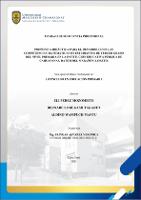Propuesta didáctica para el desarrollo de las competencias matemáticas en estudiantes de tercer grado del nivel primaria en la institución educativa pública de Cahuapanas, Datem del Marañón, Loreto

Fecha
2023Autor(es)
Perez Mozombite, Eli
Samekash Takaret, Bernabe
Wampuch Mantu, Aldino
Metadatos
Mostrar el registro completo del ítemResumen
El presente trabajo de suficiencia profesional permite dar solución a la situación problemática
de la institución educativa pública de Pongo, de esta manera se promueve desarrollar la propuesta
didáctica en el área de matemática de los estudiantes de tercer grado del nivel primaria. En la
primera parte del trabajo presentamos el marco situacional de la institución educativa, en el
segundo capítulo se presentan los aportes teóricos de Piaget con su desarrollo cognitivo, las
estructuras mentales y las cuatro etapas de desarrollo del ser humano, Vygotsky con la teoría
sociocultural, que detalla la relación de los factores sociales, históricos, y culturales, también se
describe las tres zonas de desarrollo (real, próximo, potencial) y Ausubel quien habla de los tres
tipos de aprendizaje (significativo, memorístico y funcional). En la tercera parte se detalla las
programaciones, unidades y sesiones de clase que se van a emplear con los estudiantes, y en el
último capítulo detallamos las conclusiones, recomendaciones y los anexos. The present work of professional sufficiency allows to give solution to the problematic situation of the public educational institution of Pongo. the public educational institution of Pongo, in this way it promotes the development of the didactic proposal in the area of mathematics didactic proposal in the area of mathematics for students in the third grade of primary school. In the first first part of the work we present the situational framework of the educational institution. second chapter presents Piaget's theoretical contributions with his cognitive development, the mental structures and the four stages of mental structures and the four stages of development of the human being, Vygotsky with his sociocultural theory, which details the theory, which details the relationship between social, historical, and cultural factors, and also describes the three developmental also describes the three zones of development (real, proximal, potential) and Ausubel, who speaks of the three types of types of learning (meaningful, rote and functional). The third part details the and class sessions that will be used with the students, and in the last chapter we detail the conclusions, recommendations and last chapter we detail the conclusions, recommendations and annexes.
Colecciones
- Educación Primaria [168]

